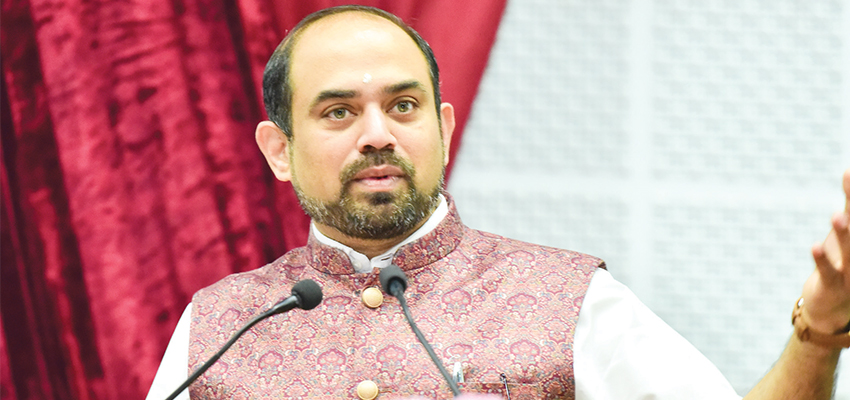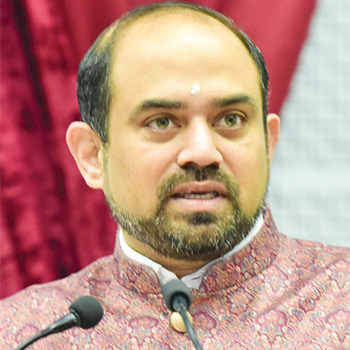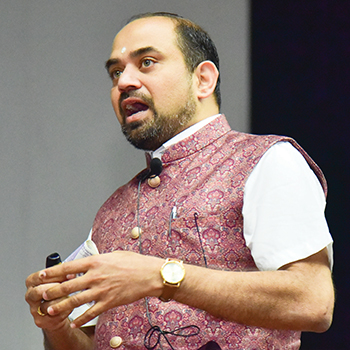Love Not, Only Money

Passion and commitment are the two differentiators that set you apart, adding the extra to the ordinary, in work, academics and life. Accomplished academician and seasoned professional, Dr. Ramakrishnan Raman, Vice Chancellor, Symbiosis International (Deemed University), has valuable nuggets of practical wisdom from his career spanning over two decades. He opined that understanding the audience is key to delivering meaningful education in today’s fast-paced, technology-driven world. Here he is speaking to Corporate Citizen about his journey and motivation as an educator, and the challenges before universities in a rapidly changing society
Corporate Citizen: First things first. Dr Raman, you are a qualified engineer. What made you take up teaching?
Dr. Ramakrishnan Raman: Teaching has always been a significant part of my family heritage. My grandfather was a schoolteacher, and my father started as a trainer before becoming a scientist at ISRO. However, teaching was not on my mind during my bachelor’s in computer science and engineering. It was only after completing my MBA and conducting a SWOT analysis that I realised teaching was the right career path for me. Despite the financial allure of corporate jobs, I found a profound sense of fulfillment in teaching, which ultimately guided my decision.
CC: So, what made you get over the dilemma?
I did join the corporate world—but after spending only a little time at Godrej, I thought of getting into teaching, for that’s where my heart lay. So, I kind of did a ‘cold calling’. I sent my CVs to the best universities in the South. I got a call from the famous Vellore Institute of Technology (VIT), Tamil Nadu, and my journey in academia commenced from there. I had an excellent peer group; the professors advised me that a career in education could be a well-rounded one only with a PhD. Professor Ashok Subramaniam from Stanford, who was working at VIT, interacted quite a bit with me, and I was the richer for it.
Hailing from Kerala, my grandfather lived in Tamil Nadu, while I was born and brought up in Andhra Pradesh, making me a polyglot fluent in several languages. A recent opportunity arose from a B-School in Maharashtra, prompting me in mind…wow it is time to learn Marathi, a decision that I embraced wholeheartedly.
I owe my gratitude to Mr. Laxmikant Satelkar, a practicing lawyer since 1987 at the High Court of Judicature at Mumbai, specialising in Labour Laws. Serving as the Assistant Government Pleader on the Original Side of the High Court since 2000, Mr. Satelkar recognised my potential and selected me for the role of Assistant Professor at Kohinoor Business School in Khandala, in Pune district.
I am also deeply thankful to Mr. Unmesh Joshi, the Managing Director, who was in the process of establishing a B-School in Khandala in collaboration with the Sprott School of Business from Carleton University, Ottawa, Canada. His trust and confidence in my abilities provided me with this incredible opportunity to join the institution.
"Educationists and teachers connect best with students when they understand who they are addressing and why. Understanding the audience is key to delivering meaningful education in today’s fast-paced, technology-driven world"
— Dr. Ramakrishnan Raman

Soon, I had an opportunity to go to Khandala, Maharashtra to work at the Kohinoor Business School. Although I was familiar with Pune, I had no prior knowledge of Khandala, aside from the popular song “Aati Kya Khandala” (smiles). I spent a rewarding 7-8 years in Khandala, found a guide and completed my doctorate. Quite by chance, I met the renowned academic, Prof. Dr. Shrikant, while taking a walk around the hills of Khandala.
Our conversation led to an invitation to visit his bungalow, and it was during this visit that I discovered he was from the iconic SP Jain Institute of Management and Research.
Following his advice, I applied to SP Jain, went through the rigorous selection process, and subsequently joined their campus in Mumbai. Transitioning from the serene environment of Khandala to the hustle and bustle of Mumbai was a significant change; Mumbai is aptly known as the city that never sleeps. However, this period was both exciting and enriching, offering immense professional and personal growth.
After that, I received an opportunity to work at Symbiosis Centre for Information Technology (SCIT). I found myself in a bit of a quandary because the position offered was that of Director, and I was only 32 years old. A friend of mine, Dr. Ajit Gaikwad, encouraged me to go ahead and apply. I protested, citing my position as an Associate Professor and not even a full Professor. Nonetheless, I applied and, as it turned out, I got the job.
The role came with its own set of challenges, as everyone reporting to me was significantly older and more experienced. An experienced colleague once remarked, "Raman, you were not born when I graduated," reminding me of the journey I still had ahead.
I am immensely grateful to Dr. S. B. Mujumdar, the Chancellor of Symbiosis International (Deemed University), and Dr. Vidya Yeravdekar, the Pro-Chancellor, for their trust and confidence in me. Their belief in my capabilities allowed me to assume the leadership role of Director at the age of 32 at SCIT.
CC: So what kept you going?
It was tough, but I was willing to push the envelope and give it a try. Ultimately, if you can prove yourself to be a person worth reporting to, everything works out. That comes only through the knowledge you have—not your age, qualifications, or experience.
CC: Speaking of knowledge, the Instagram culture is the opposite of deep learning— it promotes instant gratification. Given the changes brought in by social media, technology and changing values, what are the challenges before education?
The challenges before education are multifold. Student attention spans are indeed decreasing. They often ask themselves, "Am I getting something out of this?" Initially, there is interest, but soon they get distracted by their phones. That's a typical classroom journey. As a teacher, you can only do your best and move forward.
Take my talk today, for instance. I knew the audience comprised parents, teachers, students, and faculty, so I tailored my session to fit this diverse group. I believe most found value in it— perhaps 20% didn't, but that is to be expected.
That said, educationists and teachers connect best with students when they understand who they are addressing and why. Understanding the audience is key to delivering meaningful education in today's fast-paced, technology-driven world.
CC: What about the role of education in creating good citizens and human beings?
This should start from the school level itself. Sadly, what drives people today is money. When material gains are the prime goal, it isn’t very good for society. One must put things in perspective and say that indeed, money is important, but that will follow when you do what you love, give it your all, and excel. In my younger days, I wasn’t paid as well as I would have liked to be paid. Prof. Ashok Subramaniam, a professor from Stanford who was working at VIT Vellore when I was also working there, advised me, "Raman, start adding value to yourself. The money will then chase you; you need not chase it." It was tough for me to accept the time and patience demanded, but I am glad I went through the process.
So, it must be explained to the young: work on yourself, get that education and those all-important qualifications. Automatically, the money will follow. But somewhere that message is lost. Everyone wants placements, package, profits and prospects-the four Ps that are important in a career.
But there is a process to be followed before that. Some students need to work on their fundamentals, others on their soft skills—each one needs to add value themselves. And it has to start from a young age, from school. Everyone learns matrices and determinants in class XII. Ask them their applications, not a single soul will be able to answer. Why are you doing it? What is the final goal, they wouldn’t know? So, one can’t change at the PG level what should have been worked on in school. For instance, today’s student would question - why learn Maths when anyway, there is a calculator? The answer - for the simple reason that Maths will teach you how to think, and to think differently. Cramming is not the way to do things, understanding is. Once this happens, the learning process becomes enjoyable.
But, parents focus on the rat race, instead of the ability of the student. Thankfully, my parents said to me, go ahead and follow your heart. If you identify your strengths and give 200 per cent to that what you love, the entire cosmos will guide you to the right places. Do a good job, because you love to. Play to your strengths. I never chased the academic posts or the successes. What I preach, I practice. In a nutshell, I believe, commitment at the centre, expectations (promotion, incentives) at the periphery.
ABOUT DR RAMAN

Dr. Ramakrishnan Raman, an accomplished academician and seasoned professional, is the Vice Chancellor at Symbiosis International (Deemed University). With a Bachelor’s Degree in Computer Science and Engineering and an MBA in Systems and Marketing, and a doctoral degree in Management from Savitribai Phule Pune University, Dr. Raman’s career spans over two decades. He has served Symbiosis for over a decade in different capacities including Professor & Director, Symbiosis Centre for Information Technology; Professor & Director, Symbiosis Institute of Business Management – Pune; Dean – Faculty of Management and Director – Strategy & Development, Symbiosis International University.
Dr. Raman’s contributions extend beyond the classroom, as he has been instrumental in fostering international collaborations with universities in Japan, Canada, United Kingdom, and the United States. His prolific research in Information Systems, IT Strategy, Entrepreneurship, AI, Big Data, has earned him recognition with national and international academia. Aston University’s Aston India Centre for Applied Research, College of Business and Social Sciences, has appointed Dr. Raman as an Honorary Professor for a three-year term ending in 2027.
His commendable contributions have earned him recognition in both administrative and research spheres. In 2024, he was appointed as a distinguished member of prestigious committees by the University Grants Commission. Dr. Raman’s wealth of expertise promises to significantly enhance these committees, as his participation will play a pivotal role in effecting amendments and refining existing processes.
Dr. Raman has authored a multitude of research papers featured in prestigious international journals indexed in SCOPUS and Web of Science, further enhancing his academic credentials.
"Cramming is not the way to do things, understanding is. Once this happens, the learning process becomes enjoyable. But, parents focus on the rat race, instead of the ability of the student"
CC: Here’s coming to a question you must be asked often. The disconnect between education and industry.

Well, this is an ongoing and existing disconnect—right from the 90s to 2024. And, it will continue to be a gap. Why does the gap exist? The corporates tend to look for a workforce ready for them to deploy immediately. Let me cite an analogy to explain the situation - corporates have cars, they need drivers. So, they tend to ask educators - can you give us drivers?
Now let us change the scenario. If corporates were to come up to me and say instead - we want people who can solve mobility solutions for the problems that come up tomorrow, it would be better. It would mean they must come up with something outside the box that can help transportation change. However, the corporates keep saying, we want drivers; academia says come and prepare them yourself. That’s how we have corporate- university partnerships. But the question arises, are we only supposed to create coolies for the corporate world? Is that the objective of universities? Or are we supposed to create people who can think out of the box about the problems that come up?
In my view, we need both. Driving can be learnt easily; but finding a mobility solution to a problem is important. For instance, the traffic is bursting at the seams in metros. Who is going to think of out of the box solutions? Only if they can make them think in this direction, we can say that the universities are doing the right job.
CC: What about work-life balance? Are you an advocate?
If you are passionate about something, you are obsessed with it. So, the question of work-life balance comes in only if you are thinking of work as a task that needs to be carried out somehow. You don’t think meeting a friend is a stressful thing, do you? No, it’s something you do out of love. So, choose a profession you love, and work-life balance will take care of itself automatically. The elements of force and stress don’t come in.
CC: So, what do you like to do other than work?
I love listening to Carnatic music. I am spiritually inclined and can possibly replace a pandit when it comes to puja (smiles). I learnt the Vedas and chanted mantras from a young age. I love visiting temples too—something my daughter complains about whenever we are on holiday. She says that you haven’t taken me abroad, but we see temples on every holiday.
CC: What is the philosophy you live and work by?
Do things with a lot of commitment and passion—that will take you places.